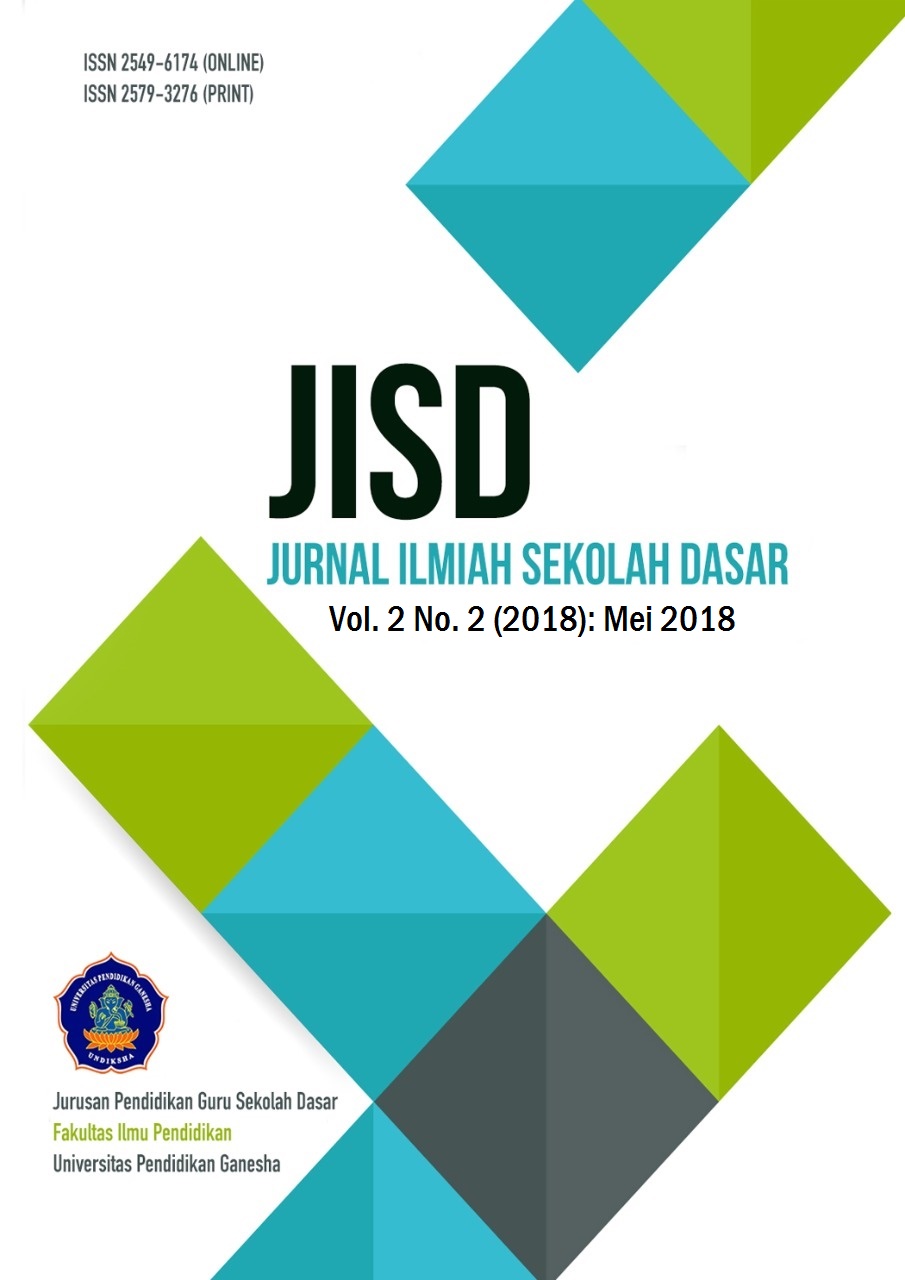Korelasi Antara Konsep Diri dengan Kemampuan Pemecahan Masalah IPS
DOI:
https://doi.org/10.23887/jisd.v2i2.15498Abstract
This study aims to determine the correlation between self-concept with the ability to solve the problem of Social Science students of grade V elementary school Gugus Untung Surapati, East Denpasar District, academic year 2017/2018. This type of research is ex post facto, correlational research. The population of this study is a class V student in Gugus Untung Surapati, East Denpasar academic year 2017/2018 which amounted to 525 students. Determination of the sample using proportional random sampling technique with 5% error rate that obtained many samples from the population is 213 students. The data obtained through self-concept questionnaire and essay test of Social Science problem solving ability done by the respondents. Data analysis technique using product moment correlation analysis. As a prerequisite test is the normality test of data distribution. Based on the analysis result obtained rcount = 0,446. At the significance level of 5% with n = 213, then obtained rtable = 0,138. Because rcount = 0.446 > rtable = 0.138 it can be interpreted that H0 rejected and Ha accepted. So it can be concluded that there is a significant correlation between self-concept with the ability to solve the problem of Social Science Class V SD Gugus Untung Surapati, with a positive correlation direction, meaning that the higher self-concept owned by students will further improve students problem solving skills of Social ScienceReferences
Adiprabowo, Raihan. 2017. Positive Personalities.Yogyakarta: Brilliant Books.
Agung, A. A. Gede. 2014. Metodologi Penelitian Pendidikan Edisi 2. Singaraja: Aditya Media Publishing.
Bachri, Syamsul. 2013. Psikologi Pendidikan Berbasis Analisis Empiris Aplikatif. Jakarta: Kencana Prenada Media Group.
Boeree, C. George. 2013. Personalities Theories: melacak Kepribadian Anda Bersama Psikolog Dunia. Jakarta: AR-RUZZ MEDIA.
BSNP. 2006. Standar Isi Untuk Satuan Pendidikan Dasar dan Menengah. Jakarta: Badan Standar Nasional Pendidikan.
Djaali. 2011. Psikologi Pendidikan. Jakarta: Bumi Aksara.
Emzir. 2012. Metode Penelitian Pendidikan. Jakarta: Rajawali Pers.
Ernawati, Renatha. 2015. “Pengaruh Konsep Diri Terhadap Pemecahan Masalah Bagi Siswa Kelas X Di SMA Negeri Jakarta Timur”, Vol. 8, No. 3
Furchan, Arief. 2007. Pengantar Penelitian dalam Pendidikan. Yogyakarta: Pustaka Pelajar.
Jakni. 2016. Metodelogi Penelitian Eksperimen Bidang Penelitian. Bandung: Alfabeta.
Koyan, I Wayan. 2007. Asesmen dalam Pendidikan. Singaraja: Universitas Pendidikan Ganesha.
Latipah, Eva. 2012. Pengantar Psikologi Pendidikan. Yogyakarta: Pedagogia.
Mairing, Jackson Pasini. 2017. Statistika Pendidikan. Yogyakarta: CV. Andi Yogyakarta.
Mappiare A T, Andi. 2004. Pengantar Konseling dan Psikoterapi. Jakarta: Rajawali Pers.
Musriandi, Riki. 2017. “Hubungan Antara Self-Concept Dengan Kemampuan Pemecahan Masalah Sistematis Siswa”. Vol. 1, No.2, (hlm 153-157)
Pucangan, Ketut Yuning Jayasri. 2017. “Hubungan Antara Konsep Diri dan Pola Asuh Orang Tua Terhadap Hasil Belajar SD Kelas II”, Vol. 5, No.2 (hlm 3)
Sanjaya, I Wayan. “Korelasi Antara Berpikir Kreatif Dengan Kemampuan Pemecahan Masalah Kompetensi Inti Pengetahuan IPS Siswa Kelas V SDN 10 Sanur, Denpasar Selatan, Pada Tahun Pelajaran 2016/2017”, Vol: , No.2 (hlm 7-8)
Santrock, John W. 2015. Psikologi Pendidikan. Jakarta: Kencana.
Setyosari, Punaji. 2015. Metode Penelitian Pendidikan dan Pengembangan. Jakarta: Kencana.
Siregar, Syofian. 2013. Metode Penelitian Kuantitatif. Jakarta: Kencana.
Slameto. 2010. Belajar dan Faktor-Faktor yang Mempengaruhinya. Jakarta: Rineka Cipta.
Sudijono, Anas. 2011. Pengantar Evaluasi Pendidikan. Jakarta: PT. Raja Grafindo Persada
Sukardi. 2016. Metodelogi Penelitian Pendidikan Kompetensi dan Praktiknya. Jakarta: Bumi Aksara.
Sugiyono. 2012. Metode Penelitian Pendidikan Pendekatan Kuantitatif, Kualitatif, dan R&D. Bandung: Alfabeta.
Sugiyono, 2017. Statistika Untuk Penelitian. Bandung: Alfabeta
Susanto, Ahmad. 2014. Teori Belajar dan Pembelajaran di Sekolah Dasar. Jakarta: Kencana Media Group.
Sutoyo, Anwar. 2012. Pemahaman Individu. Yogyakarta: Pustaka Pelajar.
Wena, Made. 2012. Strategi Pembelajaran Inovatif Kontemporer Suatu Tinjauan Konseptual Operasional. Jakarta: PT Bumi Aksara.
Winarsunu, Tulus. 2009. Statistik Dalam penelitian Psikologi & Pendidikan. Malang: UMM Press
Downloads
Published
How to Cite
Issue
Section
License
Authors who publish with the Journal Ilmiah Sekolah Dasar agree to the following terms:
- Authors retain copyright and grant the journal the right of first publication with the work simultaneously licensed under a Creative Commons Attribution License (CC BY-SA 4.0) that allows others to share the work with an acknowledgment of the work's authorship and initial publication in this journal.
- Authors are able to enter into separate, additional contractual arrangements for the non-exclusive distribution of the journal's published version of the work (e.g., post it to an institutional repository or publish it in a book), with an acknowledgment of its initial publication in this journal.
- Authors are permitted and encouraged to post their work online (e.g., in institutional repositories or on their website) prior to and during the submission process, as it can lead to productive exchanges, as well as earlier and greater citation of published work. (See The Effect of Open Access)










